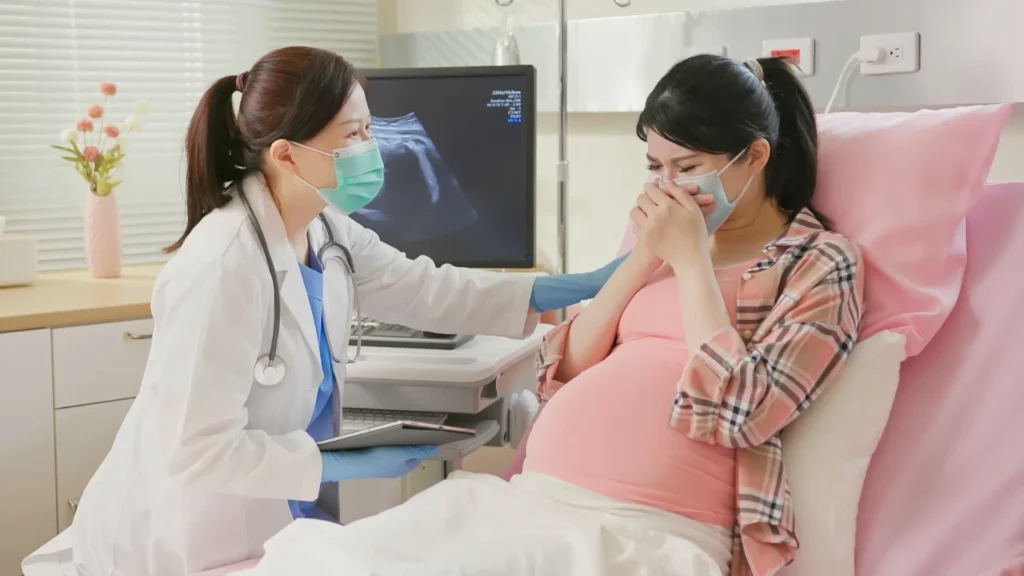Embarking on the journey of pregnancy is a profound experience, filled with anticipation. However, if your pregnancy is identified as “high-risk,” it’s natural to feel concerned about potential challenges along the way. Thoughts about possible complications can understandably cause anxiety for expectant parents.
My name is Dr. Vrushali Pillai, and as a Senior Consultant Obstetrician & Gynaecologist at Borneo Hospital, Thane, part of the Borneo group serving families across Thane, Nashik, Chhatrapati Sambhaji Nagar, and Raipur, maternal safety is our absolute priority. We believe knowledge empowers families. While it’s true that high-risk pregnancies carry an increased potential for certain issues, I want to emphasise that awareness is our greatest ally. Understanding the common complications in high-risk pregnancies allows us to detect them early and manage them effectively. This article aims to demystify some of these potential issues, explain how they are recognised, and outline the expert management strategies we employ at Borneo Hospital to ensure the best possible health for both mother and baby.
What Do We Mean by “Complications”?
In the context of pregnancy, a “complication” simply refers to a health problem that might arise affecting the mother, the developing baby, or both, which requires specific medical attention beyond standard routine care. Identifying the possibility of these complications enables your healthcare team to put proactive monitoring and management plans in place.

Common Maternal Complications in High-Risk Pregnancies
Here are some of the more frequent challenges that might occur for the mother during a high-risk pregnancy, along with how we approach their management:
1. Pre-eclampsia / Eclampsia
- What it is: A serious condition typically developing after 20 weeks, characterised by high blood pressure and often signs of damage to other organs, like the kidneys (indicated by protein in the urine). Eclampsia is a severe progression involving seizures.
- Signs to Watch For: Report immediately if you experience persistent severe headaches, changes in vision (blurriness, flashing lights, spots), pain in the upper abdomen, nausea/vomiting (especially later in pregnancy), or sudden swelling, particularly in the face and hands.
- How We Manage It: Management involves very close monitoring of your blood pressure, urine protein levels, liver and kidney function via blood tests, and careful assessment of your baby’s well-being. Medication may be used to lower blood pressure. Magnesium sulphate is often administered intravenously to prevent seizures in severe cases. Often, the most effective treatment for pre-eclampsia is delivery of the baby, the timing depends on severity and gestational age. Borneo Hospital has advanced monitoring capabilities for both mother and foetus.
2. Gestational Diabetes Mellitus (GDM)
- What it is: Diabetes that develops for the first time during pregnancy, affecting how your body uses sugar.
- Signs to Watch For: GDM often has no obvious symptoms. It’s typically diagnosed through routine screening tests (glucose challenge test or glucose tolerance test) usually performed between 24-28 weeks, or earlier if you have risk factors.
- How We Manage It: The cornerstone of management is controlling blood sugar levels. This usually involves dietary adjustments (our nutritionists at Borneo provide personalised guidance), regular, doctor-approved physical activity, and frequent blood sugar monitoring at home. Some women may also require oral medication or insulin injections if diet and exercise alone aren’t enough. Good control is vital for preventing complications like having a very large baby (macrosomia) or issues for the baby after birth.
3. Preterm Labour and Birth
- What it is: Labour that begins before 37 completed weeks of pregnancy. Birth before this time is considered preterm.
- Signs to Watch For: Be aware of symptoms like regular or frequent contractions (which may feel like tightening or period-like cramps), a change in vaginal discharge (watery, mucus, or bloody), constant low, dull backache, or pelvic pressure. Report these to your doctor promptly.
- How We Manage It: If preterm labour is suspected, assessment includes checking the cervix and monitoring contractions. Depending on the situation and how far along you are, treatments might include medications (tocolytics) to try and stop or slow down labour temporarily, and corticosteroids (steroid injections) given to you to help mature the baby’s lungs rapidly. This requires careful hospital monitoring. Borneo Hospital’s team is experienced in managing preterm labour, and our advanced NICU is fully prepared for premature infants.
4. Placental Problems (e.g., Placenta Praevia, Placental Abruption)
- What they are: Placenta praevia occurs when the placenta implants low in the uterus, partially or completely covering the cervix. Placental abruption is when the placenta separates from the uterine wall before delivery. Both can cause bleeding.
- Signs to Watch For: Painless, bright red vaginal bleeding later in pregnancy is a key sign of placenta praevia. Placental abruption often cause sudden abdominal or back pain, uterine tenderness, and potentially vaginal bleeding (which can sometimes be dark). Any bleeding during pregnancy needs immediate evaluation.
- How We Manage It: Management depends heavily on the type of problem, the amount of bleeding, the gestational age, and the well-being of mother and baby. It often involve careful monitoring with ultrasound, potential hospital admission for observation, activity restrictions (pelvic rest for praevia), and planned delivery, usually via C-section for complete praevia. Abruption can sometimes necessitate an emergency delivery. Borneo Hospital’s diagnostic imaging and emergency obstetric services are equipped to handle these situations.
5. Severe Anaemia
- What it is: A significantly low level of haemoglobin in the blood, reducing oxygen-carrying capacity. This condition is particularly prevalent in India.
- Signs to Watch For: Symptoms include extreme tiredness, weakness, shortness of breath on exertion, dizziness, pale skin, and fast heartbeat.
- How We Manage It: Diagnosis is via blood tests. Management focuses on increasing iron levels through high-dose oral iron supplements or sometimes intravenous iron infusions for faster results. Our nutritionists also provide advice on iron-rich foods. Treating severe anaemia is important for maternal energy levels and supports healthy foetal growth.
6. Infections (e.g., Urinary Tract Infections – UTIs)
- What they are: Bacterial infections of the urinary tract are common in pregnancy and can sometimes lead to kidney infections or increase the risk of preterm labour if left untreated.
- Signs to Watch For: Burning sensation during urination, increased frequency or urgency, cloudy or strong-smelling urine, pelvic or lower back pain, fever.
- How We Manage It: Diagnosis is confirmed with a urine test. Treatment involve a course of antibiotics confirmed safe for use during pregnancy. It’s crucial to complete the entire prescribed course, even if symptoms improve earlier.
Common Foetal / Neonatal Complications in High-Risk Pregnancies
High-risk pregnancies can also present potential challenges for the baby’s development or health after birth:
1. Foetal Growth Restriction (FGR) / Intrauterine Growth Restriction (IUGR)
- What it is: A condition where the baby is not growing at the expected rate inside the womb.
- How We Monitor/Identify: Regular measurement of the mother’s abdomen (fundal height) provides clues, but definitive assessment relies on serial ultrasound scans. These scans estimate the baby’s weight, monitor growth patterns over time, and specialised Doppler ultrasound assess blood flow through the umbilical cord and baby’s vessels – technologies available at Borneo Hospital.
- Management Focus: Management involves identifying any underlying maternal cause, increasing monitoring of the baby’s well-being (using NSTs and BPPs), and carefully timing delivery to balance the risks of staying in the womb versus being born early. These babies often require NICU observation after birth.
2. Macrosomia
- What it is: A term used when a baby is significantly larger than average for their gestational age (often defined as over 4kg or 4.5kg at term). Often associated with uncontrolled maternal diabetes (pre-existing or gestational).
- How We Monitor/Identify: Estimated foetal weight via ultrasound can suggest macrosomia, though these estimates can have margins of error, especially for larger babies. Close monitoring of maternal blood sugar is key if diabetes is present.
- Management Focus: The main focus is managing maternal blood sugar effectively if GDM is the cause. Delivery planning is crucial, as macrosomia can increase the risk of shoulder dystocia (difficulty delivering the baby’s shoulders) during vaginal birth or necessitate a planned Caesarean section. After birth, the baby will be monitored for low blood sugar (hypoglycaemia).
3. Birth Defects / Chromosomal Abnormalities
- What they are: Structural problems (like heart defects) or genetic conditions (like Down syndrome) present at birth. Certain factors, like advanced maternal age or specific maternal conditions, can increase the risk.
- How We Monitor/Identify: Antenatal screening tests (blood tests combined with specific ultrasound markers like nuchal translucency) can assess risk. Diagnostic tests like Chorionic Villus Sampling (CVS) or amniocentesis provide definitive diagnoses. Detailed anomaly scans around 18-20 weeks are vital for checking the baby’s structure.
- Management Focus: If a condition is identified, management involves genetic counselling to understand the implications, multidisciplinary planning with paediatric specialists (cardiologists, surgeons, etc., coordinated through Borneo Hospital), and ensuring delivery occurs at a centre with appropriate neonatal support, including advanced NICU capabilities and surgical expertise if needed.
4. Complications of Prematurity
- What they are: Health challenges faced by babies born before 37 weeks, stemming from immature organ systems.
- Examples: Respiratory Distress Syndrome (RDS) due to underdeveloped lungs, difficulties maintaining body temperature, feeding problems, jaundice, increased susceptibility to infections.
- Management Focus: Immediate, specialised care in a Neonatal Intensive Care Unit (NICU) is critical. Borneo Hospital’s Level III NICU provides advanced respiratory support (ventilators, CPAP), temperature-controlled incubators, specialised feeding methods, jaundice treatment (phototherapy), infection control, and round-the-clock monitoring by our expert neonatal team, led by myself and experienced paediatricians and nurses.

The Crucial Role of Early Detection and Proactive Management
A recurring theme in managing common complications in high-risk pregnancies is the importance of early detection and prompt action.
- Regular Antenatal Care is Non-Negotiable: Attending all your scheduled appointments allows your doctor to monitor you and your baby closely, perform timely screenings, and identify potential issues early.
- Report Symptoms Promptly: Never hesitate to contact your doctor or Borneo Hospital if you experience any concerning symptoms. Early intervention can significantly improve outcomes. Trust your instincts.
- Leveraging Expertise & Technology: At Borneo Hospital, we utilize sophisticated diagnostic tools like high-resolution ultrasound, Doppler studies, comprehensive laboratory services, and foetal monitoring technology, combined with the expertise of our specialised medical team, to effectively manage these conditions.
Borneo Hospital’s Integrated Approach
Successfully managing common complications in high-risk pregnancies requires a coordinated effort. Our approach at Borneo Hospital emphasises:
- Teamwork: Close collaboration between obstetricians, neonatologists/paediatricians, anaesthesiologists, radiologists, nutritionists, and other specialists ensures all aspects of care are covered.
- Advanced Facilities: From well-equipped labour rooms and operation theatres to advanced monitoring systems and our state-of-the-art NICU, we have the infrastructure needed for complex care.
- Personalised Care Plans: We recognise every pregnancy is different. Your management plan is customised to your specific health needs and circumstances.
- Dual Focus: Our unwavering commitment is to the health and safety of both mother and baby throughout the pregnancy, delivery, and postpartum period.
A Message of Hope and Empowerment
While learning about potential complications can be concerning, remember that knowledge is empowering. Understanding these possibilities allows you and your medical team to be vigilant and prepared. Many common complications in high-risk pregnancies are managed very successfully with modern medical care. Focus on the effective management strategies available and your crucial role as an active participant in your healthcare. Maintain open communication with your team and follow their guidance closely.
Awareness of common complications in high-risk pregnancies, coupled with early detection and expert management, is key to navigating potential challenges successfully. While extra care is needed, the goal always remains a healthy outcome for both mum and baby. At Borneo Hospital in Thane and Nashik, we are fully equipped and deeply committed to providing the high-quality, compassionate, and specialised care required for complex pregnancies. If you have concerns or questions about your pregnancy, please do not hesitate to consult your doctor or reach out to us for a consultation.



